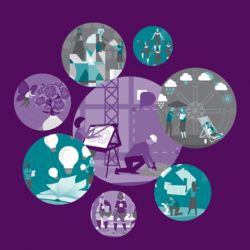To provide the best experiences, we use technologies like cookies to store and/or access device information. Consenting to these technologies will allow us to process data such as browsing behaviour or unique IDs on this site. Not consenting or withdrawing consent, may adversely affect certain features and functions.
The technical storage or access is strictly necessary for the legitimate purpose of enabling the use of a specific service explicitly requested by the subscriber or user, or for the sole purpose of carrying out the transmission of a communication over an electronic communications network.
The technical storage or access is necessary for the legitimate purpose of storing preferences that are not requested by the subscriber or user.
The technical storage or access that is used exclusively for statistical purposes.
The technical storage or access that is used exclusively for anonymous statistical purposes. Without a subpoena, voluntary compliance on the part of your Internet Service Provider, or additional records from a third party, information stored or retrieved for this purpose alone cannot usually be used to identify you.
The technical storage or access is required to create user profiles to send advertising, or to track the user on a website or across several websites for similar marketing purposes.
 A new study on recruitment and workforce trends has crowned London as the world’s most desirable city to work in, with the UK capital holding onto the top spot, despite uncertainty around Brexit and the ongoing Covid-19 pandemic. (more…)
A new study on recruitment and workforce trends has crowned London as the world’s most desirable city to work in, with the UK capital holding onto the top spot, despite uncertainty around Brexit and the ongoing Covid-19 pandemic. (more…)






 Highly educated solo-entrepreneurs value the autonomy of their work above everything else and as a result do not want to employ people, according to new research from
Highly educated solo-entrepreneurs value the autonomy of their work above everything else and as a result do not want to employ people, according to new research from 
 People working from home during the pandemic are experiencing higher levels of stress and withholding mental health conditions from their employer, for fear of a negative impact on career progression, according to a new
People working from home during the pandemic are experiencing higher levels of stress and withholding mental health conditions from their employer, for fear of a negative impact on career progression, according to a new 
 Progress for women in work could be back at 2017 levels by the end of this year as a result of the COVID-19 pandemic, according to analysis conducted for
Progress for women in work could be back at 2017 levels by the end of this year as a result of the COVID-19 pandemic, according to analysis conducted for 


 UK employers are reporting their strongest employment intentions in a year, the latest
UK employers are reporting their strongest employment intentions in a year, the latest 
 r workplace digital transformation and the urgent shift to remote working has seen the world experience two years of digital transformation in two months. New research from
r workplace digital transformation and the urgent shift to remote working has seen the world experience two years of digital transformation in two months. New research from 
 Over half (54 percent) of UK workers say they are more open to taking on a side hustle or freelance work since the Covid-19 pandemic, according to new research from
Over half (54 percent) of UK workers say they are more open to taking on a side hustle or freelance work since the Covid-19 pandemic, according to new research from 
 The COVID-19 pandemic is driving a fundamental shift in the way companies operate, accelerating the need for an adaptable and agile workforce to drive business success. According to
The COVID-19 pandemic is driving a fundamental shift in the way companies operate, accelerating the need for an adaptable and agile workforce to drive business success. According to 
 HR leaders are finding it increasingly difficult to quickly find and develop talent with the most in demand skills, yet 58 percent of the workforce needs new skill sets to get their jobs done, according to
HR leaders are finding it increasingly difficult to quickly find and develop talent with the most in demand skills, yet 58 percent of the workforce needs new skill sets to get their jobs done, according to 
 The
The 







March 6, 2021
Well, at least nobody is whinging about open plan offices anymore
by Mark Eltringham • Comment, Flexible working, Technology, Workplace design
(more…)